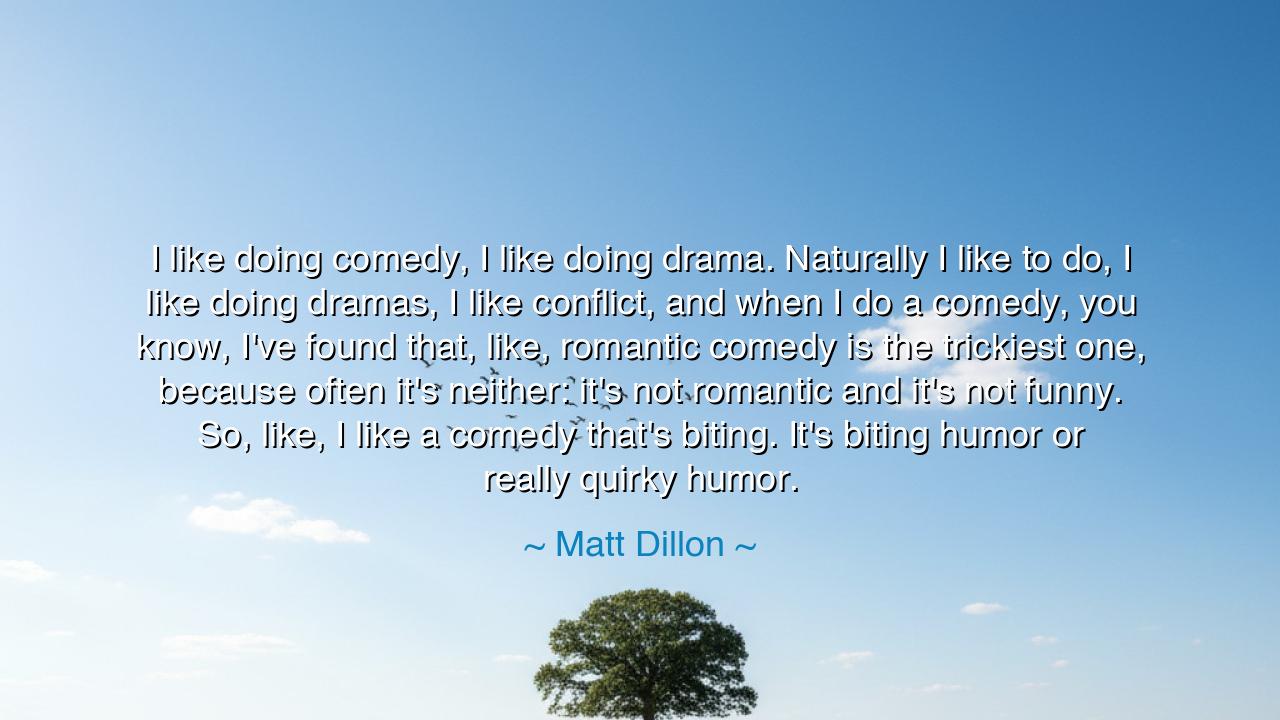
I like doing comedy, I like doing drama. Naturally I like to do
I like doing comedy, I like doing drama. Naturally I like to do, I like doing dramas, I like conflict, and when I do a comedy, you know, I've found that, like, romantic comedy is the trickiest one, because often it's neither: it's not romantic and it's not funny. So, like, I like a comedy that's biting. It's biting humor or really quirky humor.






The words, “I like doing comedy, I like doing drama. Naturally I like to do, I like doing dramas, I like conflict, and when I do a comedy, you know, I’ve found that, like, romantic comedy is the trickiest one, because often it’s neither: it’s not romantic and it’s not funny. So, like, I like a comedy that’s biting. It’s biting humor or really quirky humor,” come from Matt Dillon, the American actor whose career has spanned decades of both laughter and tragedy. In this reflection, Dillon speaks not only as an artist of the screen, but as a philosopher of emotion. Beneath his casual words lies a profound truth about human nature, authenticity, and the delicate balance between joy and struggle. For what he says of film and acting is equally true of life: the richest stories are born from conflict, and the most meaningful laughter comes from truth that dares to bite.
In the spirit of the ancients, Dillon’s words remind us that all art—and indeed all living—is a dance between light and shadow. He confesses a love for drama because drama, at its core, is conflict made visible. It is the moment when a person faces the storm and chooses to stand. The soul is tested in fire, and in that testing, truth is revealed. Yet, in the same breath, he acknowledges his draw to comedy, for laughter too is a revelation. It exposes human folly, mocks hypocrisy, and heals the heart. The artist who moves between both—between tears and laughter—walks the narrow bridge of balance that the ancients once called the path of wisdom.
But Dillon does not stop there. He laments that romantic comedy, though beloved by the world, often loses its way, becoming neither truly romantic nor truly funny. Here, he speaks to the danger of insincerity—of creating something without truth or tension. For without conflict, love becomes sweet but hollow; without honesty, humor becomes empty noise. True romance, like true comedy, must arise from vulnerability—from the willingness to expose the heart, to risk embarrassment, to reveal one’s flaws. This, Dillon implies, is what makes art real: imperfection embraced through courage.
We might recall the words of Aristophanes, the great Athenian playwright, who used comedy to mirror the absurdities of society and the contradictions of the human heart. His humor was sharp, his satire fearless. He did not shy from discomfort, and thus his laughter carried truth. Likewise, when Dillon says he loves “biting humor,” he honors this ancient tradition—the humor that cuts not to wound, but to awaken. The comedy that merely entertains is fleeting; the comedy that confronts hypocrisy and discomfort is eternal. It is this kind of humor that makes the wise both laugh and think.
Dillon’s mention of “quirky humor” reveals yet another layer of understanding: that art must surprise. Predictability dulls the spirit, but the unexpected revives it. Quirkiness—those strange, offbeat moments that defy convention—are reminders of life’s delightful unpredictability. In both film and in existence, the moments that stay with us are rarely perfect or polished; they are the ones that catch us unguarded, when truth breaks through in its strangest form. To love quirky humor is to love the beautiful imperfection of being human, to celebrate the oddities that make each soul distinct.
There is also wisdom in Dillon’s embrace of conflict. The ancients taught that without struggle, there is no growth; without friction, no spark of creation. The dramas of life—its disappointments, its clashes of will and heart—are not curses, but the forge in which character is shaped. Dillon’s art mirrors this truth: drama provides catharsis, a purging of sorrow, while biting comedy provides reflection, a cleansing through laughter. The artist who knows both, and the person who lives both, understands the full spectrum of life’s emotion—the joy that follows pain, the humor born from hardship.
Thus, my child, take this lesson from Matt Dillon’s wisdom: seek truth in everything you create and everything you live. Whether your path leads through sorrow or joy, let it be real. Do not chase laughter that is hollow, nor love that is shallow. When you speak, when you act, when you live—let your story have conflict, for it is the heartbeat of authenticity. Do not fear to be “biting,” if your truth demands it, for gentleness without honesty is weakness, and laughter without courage is silence disguised as joy.
In the end, Dillon’s words remind us that art and life alike thrive on sincerity. The greatest drama moves us because it dares to confront pain; the greatest comedy endures because it dares to tell the truth. Whether we find ourselves on the stage or in the struggle of our own days, we are all both dramatists and jesters, warriors and fools. So live boldly—speak truth even when it stings, laugh even when it aches, and embrace both your tragedies and your triumphs. For, as Dillon shows us, it is in the conflict between laughter and pain that we discover the deepest humanity—and the truest art.






AAdministratorAdministrator
Welcome, honored guests. Please leave a comment, we will respond soon